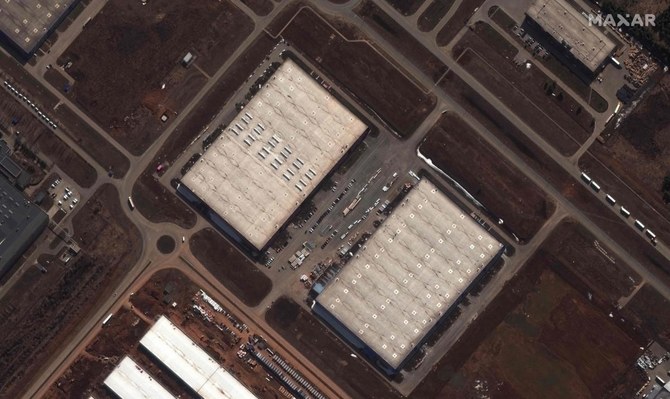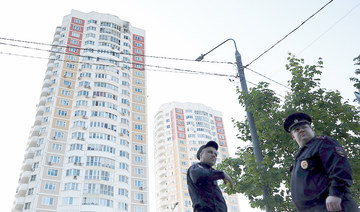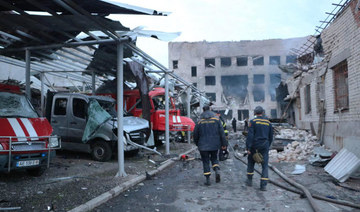WASHINGTON D.C.: The White House said on Friday that Russia appeared to be deepening its defense cooperation with Iran and had received hundreds of one-way attack drones that it is using to strike Ukraine.
Citing newly declassified information, the White House said the drones, or Uncrewed Aerial Vehicles (UAVs), were built in Iran, shipped across the Caspian Sea and then used by Russian forces against Ukraine.
“Russia has been using Iranian UAVs in recent weeks to strike Kyiv and terrorize the Ukrainian population, and the Russia-Iran military partnership appears to be deepening,” White House spokesman John Kirby said in a statement.
“We are also concerned that Russia is working with Iran to produce Iranian UAVs from inside Russia.”
Kirby said the US had information that Russia was receiving materials from Iran required to build a drone manufacturing plant that could be fully operational early next year.
“We are releasing satellite imagery of the planned location of this UAV manufacturing plant in Russia’s Alabuga Special Economic Zone,” he said.
The US has previously sanctioned Iranian executives at a defense manufacturer over drone supplies to Russia. Iran has acknowledged sending drones to Russia but said in they past they were sent before Russia’s February invasion. Moscow has denied its forces used Iranian drones in Ukraine.
Support between Iran and Russia was flowing both ways, Kirby said, with Iran seeking billions of dollars worth of military equipment from Russia including helicopters and radars.
“Russia has been offering Iran unprecedented defense cooperation, including on missiles, electronics, and air defense,” he said.
“This is a full-scale defense partnership that is harmful to Ukraine, to Iran’s neighbors, and to the international community. We are continuing to use all the tools at our disposal to expose and disrupt these activities including by sharing this with the public – and we are prepared to do more.”
Kirby said the transfers of drones constituted a violation of United Nations rules and the United States would seek to hold the two countries accountable.
Britain, France, Germany, the US and Ukraine say the supply of Iranian-made drones to Russia violates a 2015 UN Security Council resolution enshrining the Iran nuclear deal.
Under the 2015 UN resolution, a conventional arms embargo on Iran was in place until October 2020.
Ukraine and Western powers argue that the resolution includes restrictions on missiles and related technologies until October 2023 and can encompass the export and purchase of advanced military systems such as drones.
The Iranian and Russian missions to the United Nations did not immediately respond to a request for comment on the US accusations.
“We will continue to impose sanctions on the actors involved in the transfer of Iranian military equipment to Russia for use in Ukraine,” Kirby said.
He said a new US advisory issued on Friday aimed “to help businesses and other governments better understand the risks posed by Iran’s UAV program and the illicit practices Iran uses to procure components for it.”
The advisory highlighted key items sought by Iran for its development of drones, including electronics such as processors and controllers.
Russia has received hundreds of Iranian drones to attack Ukraine: White House
https://arab.news/jnjn3
Russia has received hundreds of Iranian drones to attack Ukraine: White House

- Washington says drones were built in Iran, shipped across Caspian Sea then used by Russian forces against Ukraine
9 Egyptians go on trial in Greece over deadly shipwreck, as rights groups question process

- International human rights groups argue the defendants’ right to a fair trial is being compromised as they face judgment before an investigation is concluded
The defendants, most in their 20s, face up to life in prison if convicted on multiple criminal charges over the sinking of the “Adriana” fishing trawler on June 14 last year.
International human rights groups argue that their right to a fair trial is being compromised as they face judgment before an investigation is concluded into claims the Greek coast guard may have botched the rescue attempt.
More than 500 people are believed to have gone down with the fishing trawler, which had been traveling from Libya to Italy. Following the sinking, 104 people were rescued — mostly migrants from Syria, Pakistan and Egypt — and 82 bodies were recovered.
Early Tuesday, police in riot gear clashed with members of a small group of protesters gathered in front of the courthouse and detained two people.
United Nations Secretary General Antonio Guterres has described the shipwreck off the southern coast of Greece as “horrific.”
The sinking renewed pressure on European governments to protect the lives of migrants and asylum seekers trying to reach the continent, as the annual number of people traveling illegally across the Mediterranean continues to rise.
Lawyers from Greek human rights groups are representing the nine Egyptians, who deny the smuggling charges.
“There’s a real risk that these nine survivors could be found ‘guilty’ on the basis of incomplete and questionable evidence given that the official investigation into the role of the coast guard has not yet been completed,” said Judith Sunderland, an associate director for Europe and Central Asia at Human Rights Watch.
Authorities say the defendants were identified by other survivors and the indictments are based on their testimonies.
The European border protection agency Frontex says illegal border detections at EU frontiers increased for three consecutive years through 2023, reaching the highest level since the 2015-2016 migration crisis — driven largely by arrivals at the sea borders.
France begins its first war crime trial of Syrian officials

- The Paris Criminal Court will try the three officials for their role in the deaths of two French Syrian men
PARIS: The first trial in France of officials of the Syrian regime of Bashar Assad is to begin on Tuesday, with three top security officers to be tried in absentia for complicity in crimes against humanity and war crimes.
The Paris Criminal Court will try the three officials for their role in the deaths of two French Syrian men, Mazzen Dabbagh and his son Patrick, arrested in Damascus in 2013.
“For the first time, French courts will address the crimes of the Syrian authorities, and will try the most senior members of the authorities to ever be prosecuted since the outbreak of the Syrian revolution in March 2011,” said the International Federation for Human Rights (FIDH).
The war between Assad’s regime and armed opposition groups, including Daesh, erupted after the government repressed peaceful pro-democracy protests in 2011.
The conflict has killed more than half a million people, displaced millions, and ravaged Syria’s economy and infrastructure.
Trials into the abuses of the Syrian regime have taken place elsewhere in Europe, notably in Germany.
But in those cases, the people prosecuted held lower ranks and were present at the hearings.
Ali Mamlouk, former head of the National Security Bureau, Jamil Hassan, former director of the Air Force intelligence service, and Abdel Salam Mahmoud, former head of investigations for the service in Damascus, are subject to international arrest warrants and will be tried in absentia.
Scheduled to last four days, the hearings will be filmed.
War crimes
At the time of the arrest, Patrick Dabbagh was a 20-year-old student in his second year of arts and humanities at the University of Damascus. His father Mazzen worked as a senior education adviser at the French high school in Damascus.
The two were arrested in November 2013 by officers who claimed to belong to the Syrian Air Force intelligence service.
“Witness testimony confirms that Mazzen and Patrick Abdelkader were both taken to a detention center at Mezzeh Military Airport, which is run by Syrian Air Force Intelligence and notorious for the use of brutal torture,” the International Federation for Human Rights said, stressing that the pair were not involved in protests against the Assad regime.
They were declared dead in 2018. The family was formally notified that Patrick died on 21 January 2014. His father Mazzen died nearly four years later, on 25 November 2017.
In the committal order, the investigating judges said that it was “sufficiently established” that the two men “like thousands of detainees of the Air Force intelligence suffered torture of such intensity that they died.”
During the probe, French investigators and the Commission for International Justice and Accountability (CIJA), a non-governmental organization, collected accounts of torture and mistreatment at the Mezzeh prison, including the use of electric shocks and sexual violence, from dozens of witnesses including former detainees.
Lawyer Clemence Bectarte, who represents the Dabbagh family and the International Federation for Human Rights, said the trial was a new reminder that “under no circumstances” should relations with the Assad regime be normalized.
“We tend to forget that the regime’s crimes are still being committed today,” she said.
France backs ICC after prosecutor seeks arrest warrants for Israel’s Netanyahu

- If such warrants are issued, members of the court, could be put in a diplomatically difficult position
PARIS: France backs the International Criminal Court (ICC) and the ‘fight against impunity’, its foreign ministry said after the court’s prosecutor sought an arrest warrant for Israeli Prime Minister Benjamin Netanyahu and others for alleged war crimes.
On Monday, ICC prosecutor Karim Khan said he had requested arrest warrants for Netanyahu, his defense chief Yoav Gallant and three Hamas leaders, including its chief, Yahya Sinwar.
If such warrants are issued, however, members of the court, which includes nearly all countries of the European Union, could be put in a diplomatically difficult position.
“France supports the International Criminal Court, its independence and the fight against impunity in all situations,” the foreign ministry said in a statement late on Monday.
While US President Joe Biden called the legal step against Israeli officials “outrageous,” the French foreign ministry took a different stance.
It reiterated both its condemnation of Hamas’s ‘anti-Semitic massacres’ on Oct. 7 as well as its warnings over possible violations of international humanitarian law by Israel’s invasion of the Gaza strip.
“As far as Israel is concerned, it will be up to the court’s pre-trial chamber to decide whether to issue these warrants, after examining the evidence put forward by the prosecutor ... ,” the ministry said.
Protest at Greek parliament before trial of shipwreck that killed several migrants, including Pakistanis

- Adriana fishing trawler sank off a Greek coast in June 2023 carrying hundreds of migrants from Pakistan, Syria and Egypt
- Protest held in support of nine Egyptian survivors on board migrant boat who are charged with causing incident, human smuggling
Dozens gathered outside the Greek parliament on Monday (May 20) for a protest ahead of the trial of nine Egyptian men facing smuggling charges in connection with the migrant shipwreck last year.
On June 14, 2023, the Adriana fishing trawler, carrying between 500 and 700 migrants from Pakistan, Syria and Egypt sank off the southern town of Pylos, in international waters, on its way from Libya to Italy. Some 104 men survived and only 82 bodies have been recovered.
The protest was held in support of the nine Egyptian survivors who were on board the migrant boat and who have been charged with causing the incident, participating in a criminal organization, and migrant smuggling.
They have denied any wrongdoing.
The circumstances of the sinking of the Adriana in June remain a source of dispute between the Greek authorities and groups supporting the rights of survivors and migrants — meaning the trial could be the first opportunity to officially hear the accounts of some of those present at the time.
Survivors have accused the Greek coast guard of capsizing the boat. The authorities, which monitored Adriana for hours, say it overturned when a coast guard vessel was about 70 meters away. The coast guard service has denied any wrongdoing.
It remains unclear what happened in the time between the coast guard being alerted to the presence of the vessel and when it capsized.
University of California academic workers strike to stand up for pro-Palestinian protesters

- Israel has killed more than 35,000 Palestinians, according to Gaza’s Health Ministry
SAN FRANCISCO: Graduate students at the University of California, Santa Cruz walked off their jobs and went on strike Monday, the first campus to do so as part of a systemwide protest against a public university they say has violated the speech rights of pro-Palestinian advocates.
United Auto Workers Local 4811 represents 48,000 graduate students who work as teaching assistants, tutors, researchers and other academic employees on the 10-campus UC system. Organizers said the campuses will not strike all at once, opting instead for rolling strikes, to protest the arrests and forcible ejection by police of union members who participated in demonstrations calling for an end to the war in Gaza.
Rebecca Gross, a UC Santa Cruz graduate student in literature and union leader, said at least 1,500 people were on strike Monday and had no plans to return to work until the union reaches a deal with the university. Students and researchers are not teaching, grading or working in their labs, and they are withholding data, she said.
“Police were unleashed and given the go-ahead to arrest protesters,” at the Los Angeles, San Diego and Irvine campuses, she said.
University officials say the strike is unlawful and in violation of the union’s contract, which prohibits work stoppages. Both sides have filed unfair labor practice complaints with the California Public Employment Relations Board.
The union is demanding amnesty for all academic employees, students and faculty who face disciplinary action or arrest due to the protests. It’s also seeking divestment from UC’s investments in weapons makers, contractors and companies aiding Israel in its war against Hamas, among other issues.
Tobias Higbie, a labor historian and director of the Institute for Research on Labor and Employment at UCLA, said it is not unusual for unions to flex their muscle over broad workplace issues that are not narrowly tied to wages and benefits.
“They’re not everyday events, and maybe not even every year events,” he said. “But they’re not unheard of.”
The union’s action may be surprising to some, but so was what happened at UCLA earlier this month, Higbie said. On May 1, police in riot gear ordered the dispersal of more than a thousand people gathered on campus to support Palestine, and warned that those who refused to leave would face arrest.
The night before, police had waited to intervene as counter-protesters attacked the pro-Palestinian encampment, causing injuries. California Gov. Gavin Newsom denounced the delay.
Scott Hernandez-Jason, an assistant vice chancellor with UC Santa Cruz, said afternoon classes are being conducted remotely Monday.
“Our primary goal is to minimize the disruptive impact, especially given the many educational and research challenges that have affected students and researchers in recent years,” he said in an email. “Academic and operational continuity is essential to the University of California’s education and research mission and a core responsibility to our students.”


















